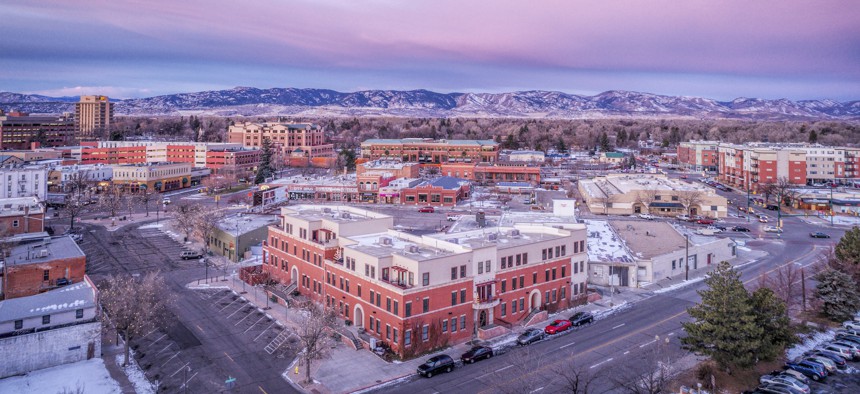Movement to Make Broadband a Public Utility Gains Momentum in Colorado

Fort Collins, Colorado Shutterstock
Front Range communities like Longmont and Fort Collins have been on the front lines of an ongoing battle over improving internet speeds, access and reliability.
Residents casting ballots in nearly 20 city- and county-level elections across Colorado earlier this month voted to remove a legal barrier that prevents them from building their own high-speed internet networks that are owned and operated as a public utility.
It’s a movement that has gained steam in a state where internet access is largely controlled by telecommunication giants Comcast and CenturyLink. As Route Fifty reported in 2015, Colorado residents voted in elections that year to lift the ban in all of the 27 cities and all of the 18 counties that included a measure on their ballots. Half the counties in the state have now voted in favor of at least exploring municipal broadband.
Tom Roiniotis, general manager of power and communications for Longmont, Colorado, told Denver’s ABC7 / KMGH-TV that he wasn’t the least surprised.
“People aren’t satisfied with the service, the speed or the price they’re getting from the incumbent providers,” he said.
Longmont is providing the kind of internet many cities and towns around the state are seeking.
In 2011, Longmont residents voted in favor of public broadband, and over the last six years, the Front Range city’s Nextlight network has been delivering fiber-optic gigabit internet to homes for $50 dollars a month. It’s internet as a utility, a service delivered reliably by the city alongside clean water, electric power and garbage collection.
Addressing the broadband problem in Longmont was no small accomplishment. City officials and residents cut a path through a forest dense with political and corporate weeds.
Telecommunication companies spent more than half a million dollars opposing the initiative in Longmont vote before it passed—$200,000 in 2009 and $400,00 in 2011.
This year, telecommunications companies spent $450,000 in one Colorado city alone—Fort Collins just north of Longmont—in a failed attempt to defeat that city’s municipal broadband initiative. The money funded an advertising campaign that news organizations labeled “misinformation.” A Comcast spokesperson similarly was called out for spreading false information to Fort Collins residents about the speed and costs of Longmont’s municipal digital network.
The broadband battles will continue.
The telecommunications industry is one of the most powerful players at the state Capitol in Denver, employing the largest army of lobbyists in the building and holding sway there on both sides of the aisle—a notable advantage in today’s partisan climate that’s no longer enjoyed by other prominent Colorado industries, including oil and gas drillers and gun sellers.
Indeed, the votes across Colorado this month and similar votes years before came in response to bipartisan Senate Bill 152, passed in 2005, which prohibits local governments from using public money to develop internet services—a law similar to those passed in some 18 other states. The bill was sponsored by state Sen. Jennifer Veiga, a Democrat from Denver. It was pushed, if not penned, by lobbyists for Qwest and Comcast, who pitched it as an attempt to ensure compatibility across the state and to fuel private-sector competition.
In hindsight, local officials have found it difficult not to fault lawmakers who supported the bill for being susceptible to big-money fast-talkers and muddled about how the Internet worked and how vital a role it would play in everyday life in every part of the state. Even at the time, tech-savvy Coloradans living in farm country and in mountain towns lamented the bill’s passage.
“SB 152 should be killed. It accomplishes nothing and retards everything in Colorado’s information future,” wrote Colorado Springs resident and pioneering rural broadband advocate Dave Hughes.
In 2015, BroadbandNow rated Colorado 32nd in broadband service among the 50 states. Some 894,000 residents have no access to wired Internet service capable of delivering at least a low-grade 25 megabytes-per-second download speeds.
Last spring, state Sen. Larry Crowder, a Republican who represents a sprawling rural southeastern district, told Route Fifty that many of his constituents were still languishing in a broadband wilderness, watching a world moving at fiber-optic speeds pass them by.
“They’re sitting in library parking lots at night just to surf the Web,” he said. “Young people looking for work, they can’t get started with their lives.”
In an interview conducted around the same time, state Sen. Kerry Donovan, a Vail Democrat who has been stymied repeatedly in her efforts to clear roadblocks to rural broadband development in the state, said the issue underlines the limits of free-market ideology.
“People who are interested in this topic, including people in this building, know what’s going on,” she said. “They know it will take significant resources to connect the state’s rural and mountain areas. They also know the populations in these areas are very small and so there’s no real money to be made by the telecommunication companies in serving these communities. They know the companies aren’t going to do it. So who’s going to do it?” Donovan turned her palms up and raised her eyebrows.
She knows that the answer is becoming increasingly clear with each passing election: Local governments are going to do it, with the overwhelming support of voters.
John Tomasic is a journalist based in Seattle and previously covered the Colorado State Capitol.
NEXT STORY: Tampa demos connected-vehicle tech to draw volunteers





